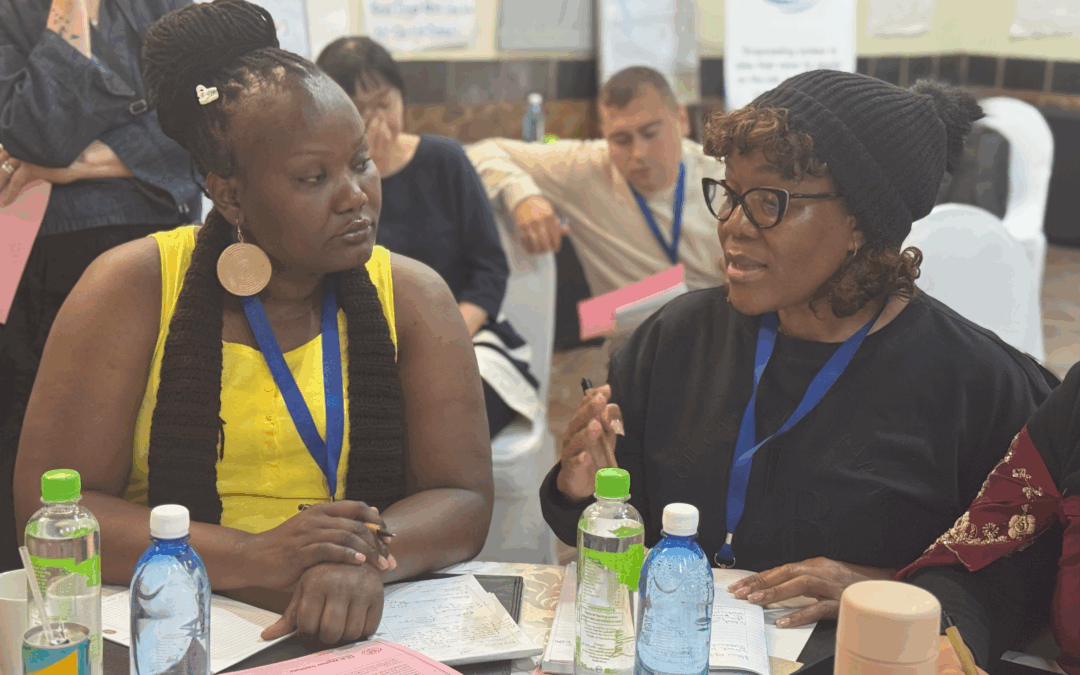
Aug 27, 2025
Nineteen union leaders and labor rights defenders working to advance democracy in communities around the world convened in South Africa in June as part of the Global Labor Leadership Initiative (GLLI), a multi-year Solidarity Center partnership with Cornell ILR. The GLLI connects union leaders worldwide to share strategies and build stronger movements. By defending rights, winning safer workplaces and lifting new voices into leadership, they show how democracy grows when workers have the power to shape change.
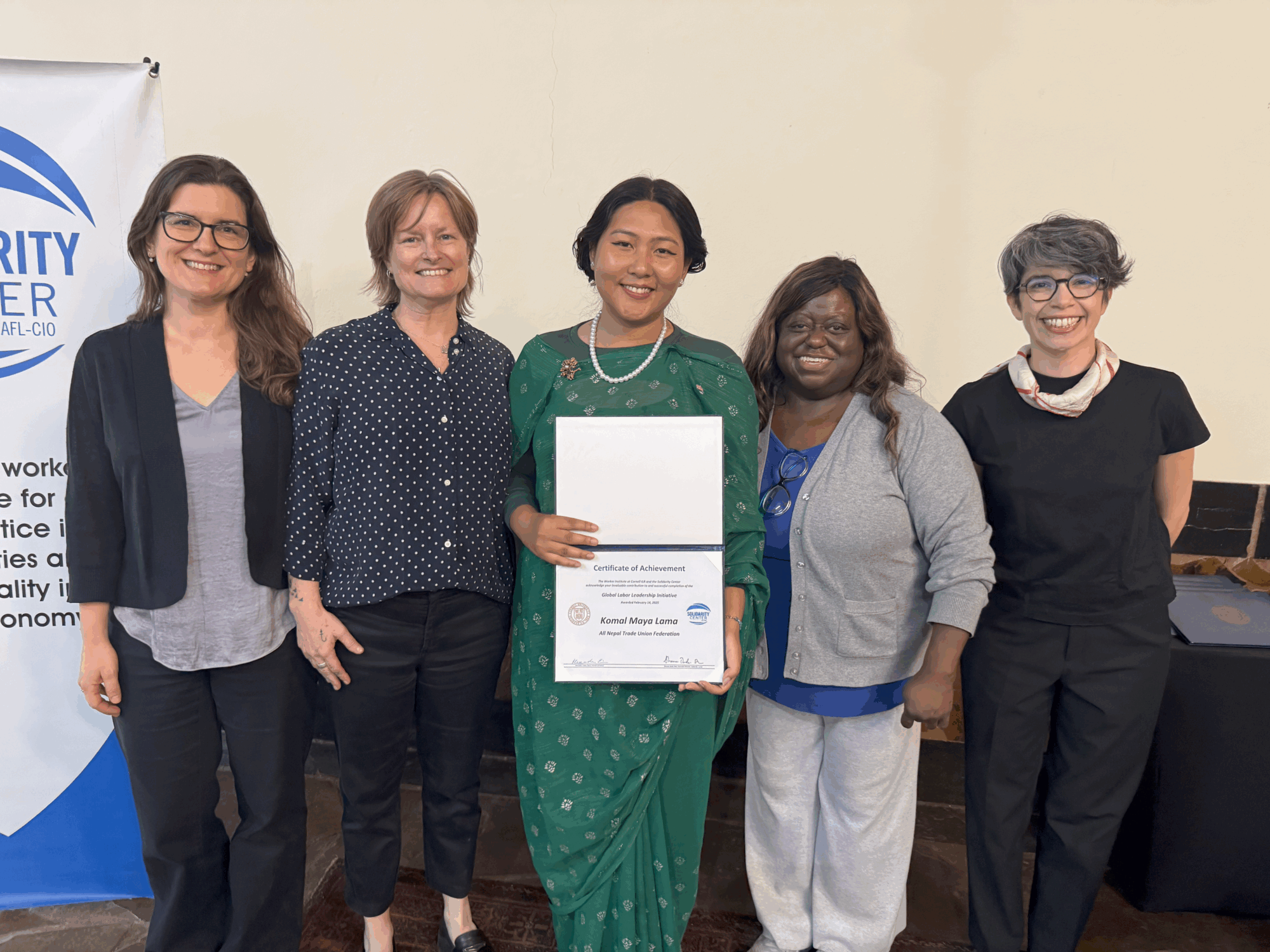
“It feels like I am not alone in this journey,” said All Nepal Health Volunteer Workers’ Union (ANHVWU) President and GLLI participant Komal Maya Lama, who accepted a completion certificate from Solidarity Center and Cornell ILR Worker Institute GLLI facilitators. Photo: Connie Mabin
“It’s amazing to know about the people all over the globe,” said young worker Komal Maya Lama, All Nepal Health Volunteer Workers’ Union (ANHVWU) president and 2025 GLLI participant. “It feels like I am not alone in this journey. I have built a beautiful bond and learned so many things from those leaders.”
Annually, the GLLI provides participants with solidarity and skills-building opportunities so they can help build a dynamic, powerful and inclusive labor movement to transform society and the economy so that it works for workers.
This year, GLLI participants from Kenya, Lesotho, Liberia, the Maldives, Nepal, Nigeria, the Philippines, Serbia, Sierra Leone, South Africa and Taiwan met near Johannesburg from June 22-27 where they shared strategies to tackle in-country and mutual challenges affecting working people, often in the face of brutal conditions, and worked to strengthen global movement building.
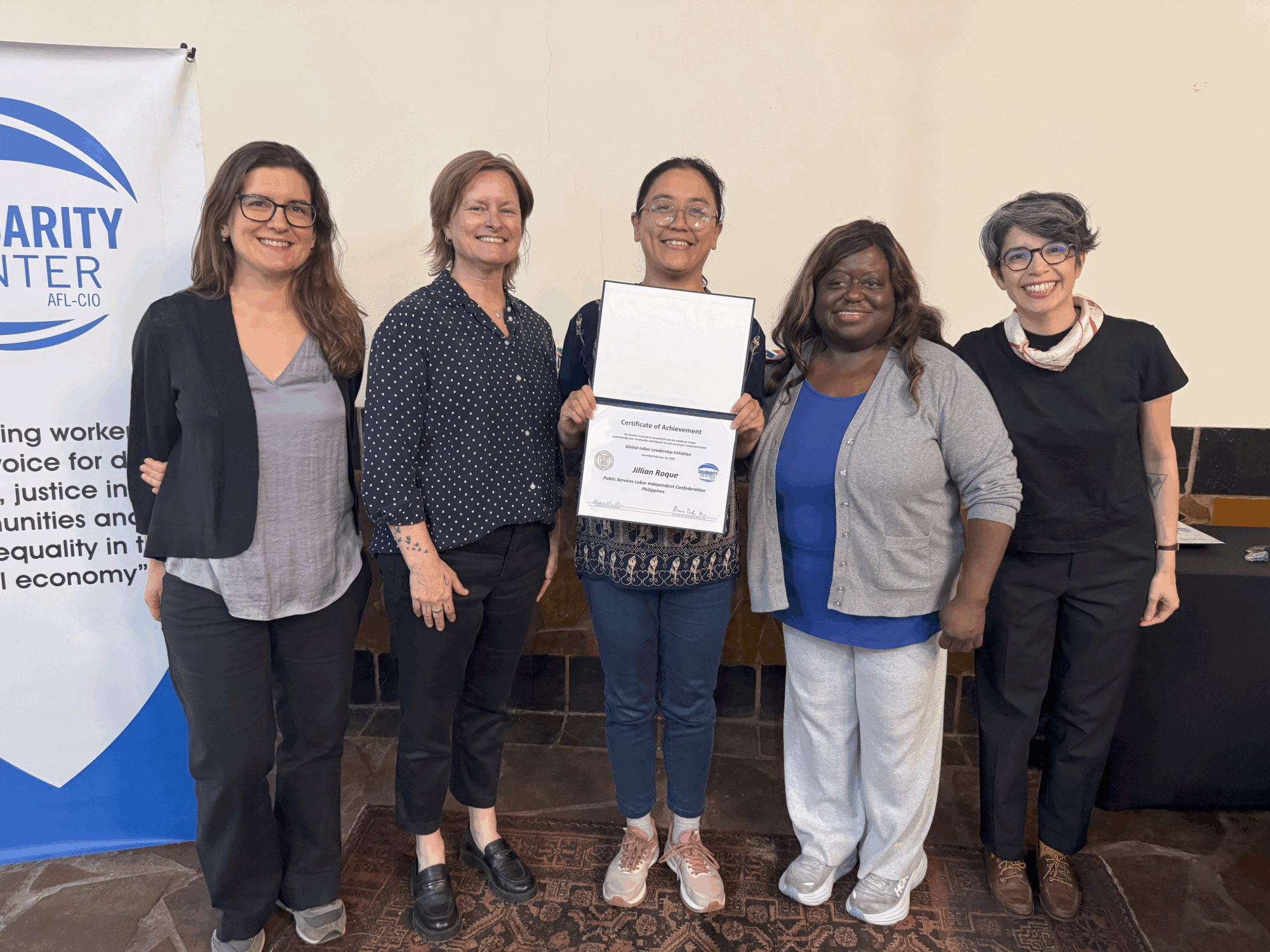
“I’ve gained tools I can use to make my leadership more effective,” said Philippines Public Service Labor Independent Confederation (PSLINK) Deputy General Secretary and Chief of Staff Jillian Roque, who accepted a completion certificate from Solidarity Center and Cornell ILR Worker Institute GLLI workshop facilitators. Photo: Connie Mabin
“I’ve gained a lot of very practical things: tools I can use to make my leadership more effective, more strategic, more intentional–the very things we need to really make changes on the ground,” said Jillian Roque, deputy general secretary and chief of staff of the Philippines Public Service Labor Independent Confederation (PSLINK).
Democracy depends on working people and their organizations to keep it resilient, said 2025 GLLI participants, who discussed unions’ unique role and capacity to push back on unjust and undemocratic forces. Building on a 2024 retreat in Sri Lanka that focused on individual leadership assessment and development, the South Africa retreat broadened the lens to thinking about how unions can bolster their organizations and strategies across social movements. They shared approaches for defending and promoting worker rights in the face of an ever-growing assault across the globe on working people.
“Trade unions have the best position to get people really together,” said a GLLI participant who is an independent labor activist.
“Connecting with people doesn’t mean that you put people on social media and attract their attention; it is really about how you can interact with them. Trade unions are so crucial to the democratic movement for discussing issues and hearing people’s voices: To get people really together,” he said.
Worker rights are in free fall across every continent, leading the ITUC to warn this year against a “billionaire coup against democracy that now threatens democracy itself.” According to the 2025 International Trade Union Confederation (ITUC) Global Rights Index, workers’ access to justice was restricted in 72 percent of countries during the reporting period, representing the worst level ever recorded.
As the largest democratic movement in the world, unions are uniquely placed to defend and expand democracy, not only through elections but in the workplace, in communities, and national and global institutions. Where independent unions provide individuals with the opportunity to elect and be leaders, and join in common cause for better wages, benefits and working hours, and where organized labor holds politicians accountable, democracy thrives.
“Unions are a school for teaching people how to organize and fight for their dignity and rights and how people get others to join them. That’s why we’ve seen unions on the forefront in defending democracy in Belarus, in Zimbabwe and eSwatini, in Hong Kong and in Tunisia,” said Solidarity Center Executive Director Shawna Bader-Blau at last year’s GLLI convening, in Washington, D.C..
Unions benefiting from their leaderships’ participation in the 2025 GLLI in South Africa included:
- Kenya’s Amalgamated Union of Kenya Metal Workers (AUKMW)
- Kenya Medical Practitioners Pharmacists and Dentists Union (KMPDU)
- Lesotho Public Employees Union (LEPEU)
- Liberia’s United Workers Union of Liberia (UWUL)
- Maldives Health Professional Union (MTUC)
- Nepal’s All Nepal Health Volunteer Workers’ Union (ANHVWU)
- Nepal’s General Federation of Nepalese Trade Unions (GEFONT)
- Nepal Trade Union Congress (NTUC)
- Nigeria’s Federation of Informal Sector Workers of Nigeria (FIWON)
- Philippines’ Associated Labor Union (ALU)
- Philippines’ Public Service Labor Independent Confederation (PSLINK)
- Serbia’s trade union confederation Nezavisnost
- Sierra Leone Domestic Workers Union (SLeDoWU)
- South Africa’s National Education, Health and Allied Workers’ Union (NEHAWU)
- South Africa’s Federation of Unions of South Africa (FEDUSA)
- Taiwan Domestic Caretakers Union (DCU)
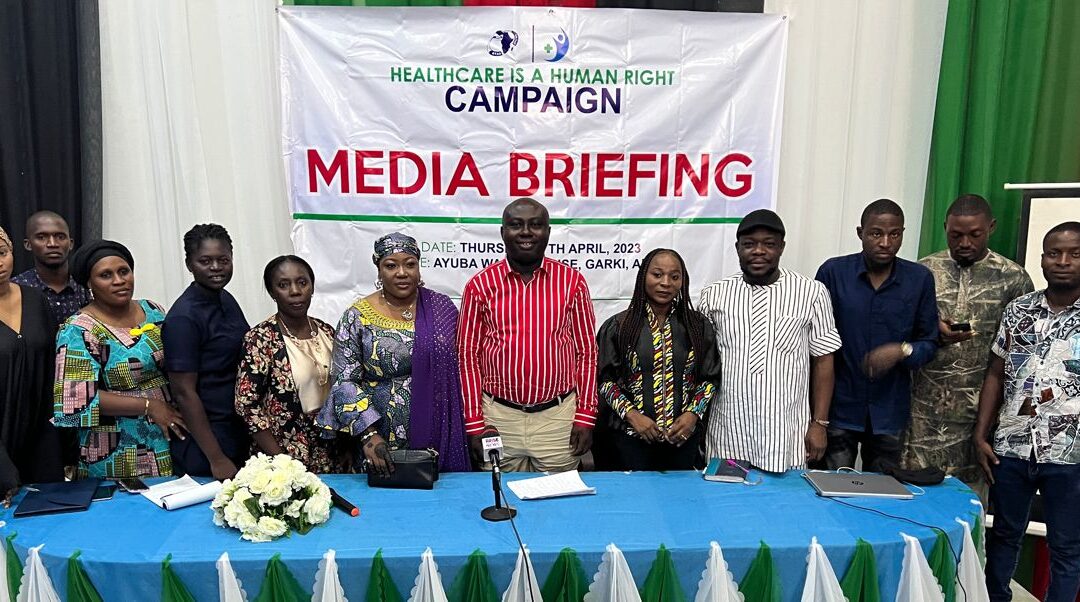
Jul 21, 2025
Providing workers around the globe with the tools they need to achieve decent wages and safe working conditions, the Solidarity Center strengthens workers’ ability to engage in such democratic practices as the ability to freely speak out, form unions and associations and shape the futures for them and their communities.
Through funding by the National Endowment for Democracy (NED) high-impact democracy investments, the Solidarity Center is bringing about its core belief that when working people have the freedom and tools to join together in unions and associations, bargain with employers and steer their own course, they will build more just, inclusive and democratic societies.
In recent years, Solidarity Center has transformed millions of lives in dozens of countries:
- Enabling working people to improve access to health care in Nigeria, where the government provided nearly $70 million to bolster the country’s health infrastructure following a Solidarity Center effort advocating increased public spending on health care and boosting health care workers’ wages and working conditions;
- Building power with more than 1,000 workers cutting and harvesting sugar cane in the Dominican Republic to secure decent wages and living conditions and safety at work by exercising their democratic freedoms;
- Improving health and safety at more than 1,000 worksites in Serbia through training and support, which also enabled workers to collaborate with the government and the Serbian Association of Employers to address safety and workplace health hazards.
- In Thailand, Solidarity Center improved conditions for workers making garments and electronics in supply chain factories, Solidarity Center efforts assist workers in their efforts to collect unpaid wages, such as at the Brilliant Alliance Thailand (BAT).
“With the support of Solidarity Center, which negotiated directly with the multinational company (the customer of BAT), 1,250 workers won back $8.3 million in wages and severance payments owed to us,” said former garment worker, Teuanjai Waengkham.
The Philippines, Central Asia, Morocco and the Maldives provide more glimpses in Solidarity Center efforts to strengthen a new generation of advocates for workers’ fundamental rights, and improve wages and job safety that often expand to nonunion workers and entire communities.
Fair Wages in the Philippines
Across the Philippines, workers are frequently not paid what they are owed. Bolstered by the Solidarity Center, many are now exercising their democratic rights to advocate for—and receive—fair pay.
Solidarity Center efforts led to a recent ruling granting 7.2 million PHP ($128,000) in lost wages for digital platform drivers for FoodPanda in Cebu. As they joined together in their new union, RIDERS-SENTRO, the drivers could connect with local governments to press their concerns and make their voices heard in a fragile democracy.
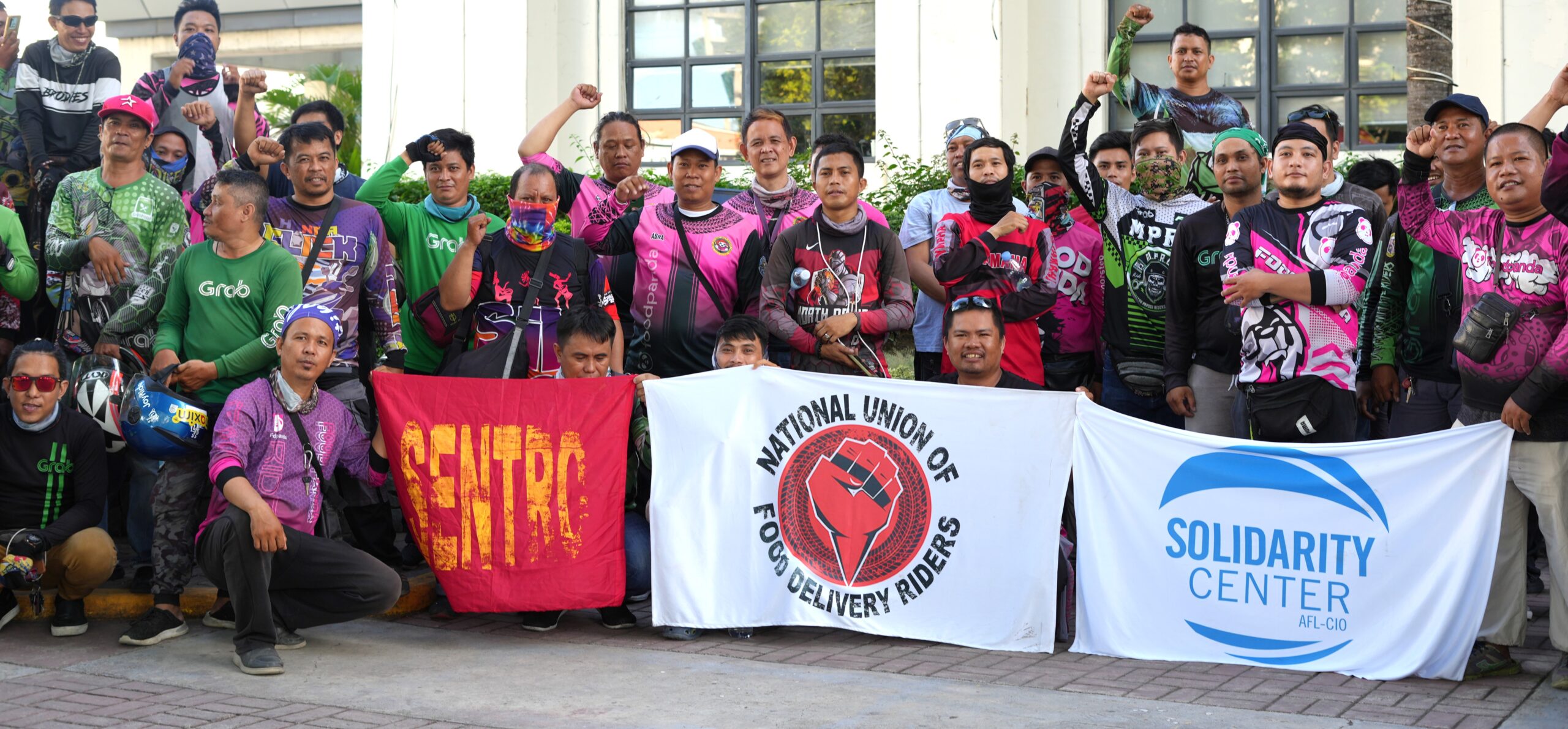
Food delivery riders improved pay at FoodPanda in Cebu, Philippines, part of platform workers’ efforts to assert their rights, protect their lives and improve working conditions.
across the globe.
FoodPanda is appealing the ruling, but the drivers say that with a union, they are confident of their ability to win their rights on the job. When working people have the freedom and tools to organize, bargain and lead, they will build more just, inclusive, and democratic societies.
“Because of the union, we have the fighting spirit for this,” says Abraham Monticalbo, Jr., a RIDERS-SENTRO member. Delivery drivers empowered to achieve decent wages boost their living conditions—and that of their family.
“We realize our power, our rights.”
Forging a New Generation of Workers in Central Asia
Many young people finish school or college and start jobs without knowing their legal rights at work, or how to identify workplace practices that reflect corruption.
In Central Asia, where the Solidarity Center hosts a Regional Youth School, multi-day workshops raise awareness about workplace violations, while empowering young people, as key agents of change, to stand up for worker rights, challenge corruption and take initiative in their communities.
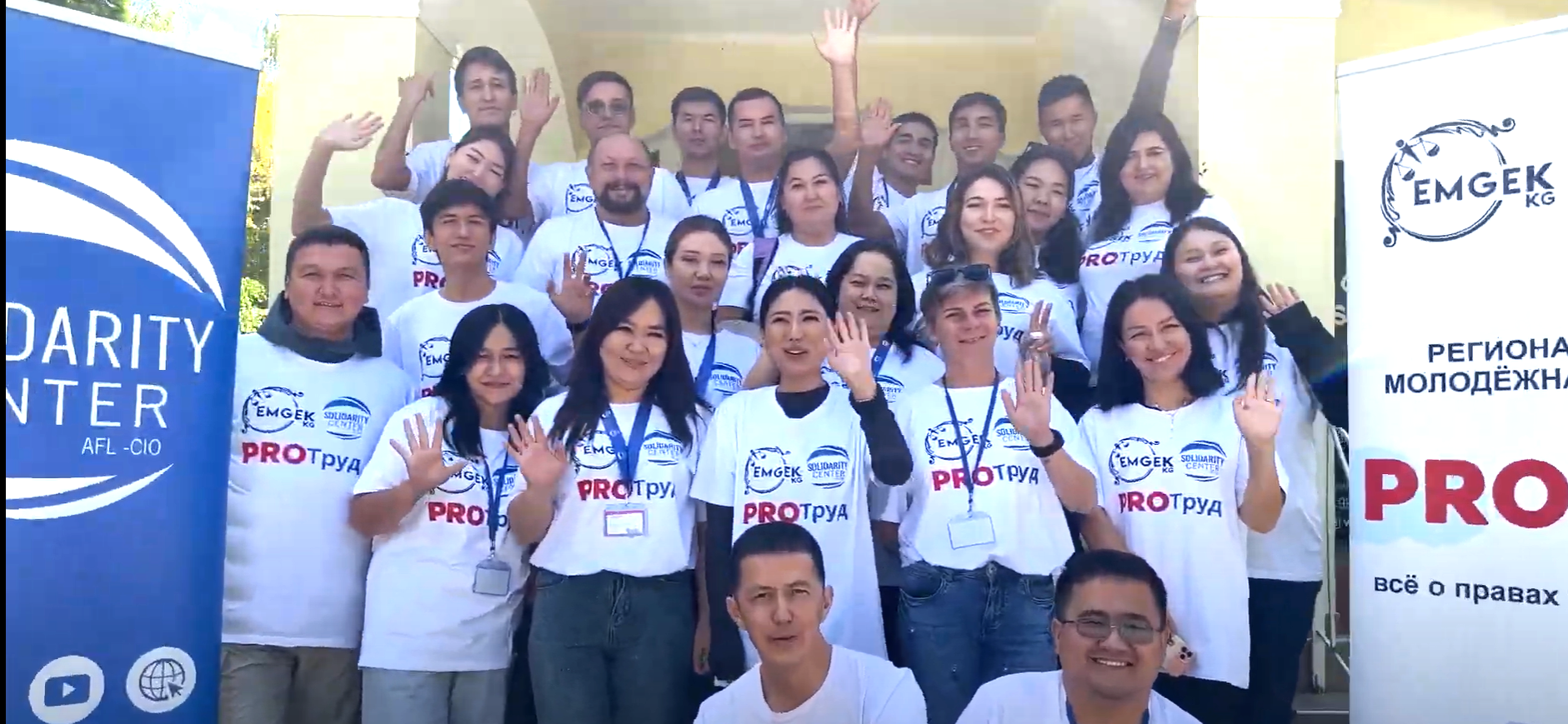
Participants from Kazakhstan, Kyrgyzstan and Uzbekistan took part in a regionwide leadership seminar to increase labor strategies for battling corruption. Credit: Solidarity Center
“We learned how to protect labor rights, how to fight [workplace] corruption,” Salamabekova Meerim, a member of the trade union of medical workers in Kyrgyzstan, said about a recent workshop. “These lessons give us valuable tools to improve our lives and strive for better conditions.”
In a recent three-day workshop, 18 young leaders from Kazakhstan, Kyrgyzstan and Uzbekistan from areas such as health care and mining, engaged in interactive learning that combined professional input with participatory exercises, blending lectures with gamified elements, such as role-playing and interactive tools.
Participants said they plan to hold peer-to-peer training sessions on labor rights and workplace corruption in their countries, countries.
By creating a strong framework—expanding young workers’ ability to turn their ideas into action—the Solidarity Center continues its bottom-up, partnership approach, one that results in permanent, lasting change.
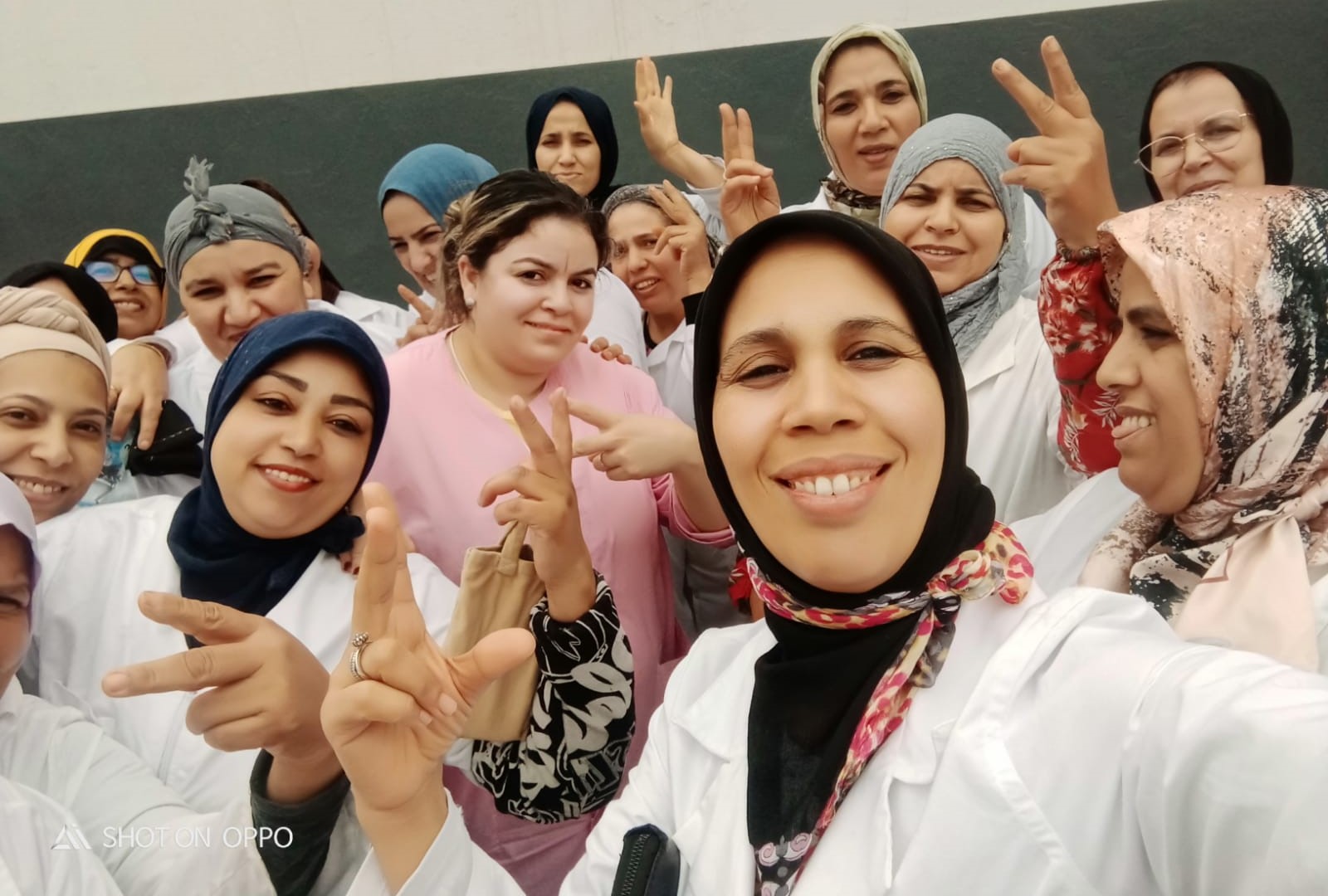
Nearly 2,000 workers at textile factories in Casablanca, Morocco, now can receive decent pay, health care protection and a voice on the job after joining UMT. Credit: Solidarity Center / Hicham Ahmaddouh
Morocco Textile Workers Win Dignity, Decent Work
For the nearly 2,000 workers at seven textile factories in Casablanca, Morocco, forming a union enabled them to receive decent pay, health care protection and a voice on the job. Joining together also meant achieving success when exercising democracy.
“We joined the union primarily to preserve our dignity, which some managers have trampled on,” said one worker, who voted for the union. (Names are not used to protect workers’ privacy.)
In November, the workers formed unions through the Moroccan Workers’ Union (UMT) and the federation of textile workers. Addressing unsafe and unhealthy working conditions was critical in the factories, where they are involved in leather production, sewing, dyeing and garment manufacturing.
They also sought fair wages—workers often were not paid, and received insufficient compensation when frequently required to work overtime—or engaged in fewer hours than specified by the government.
As in countries worldwide, the Solidarity Center teamed up with union partners, in addition to connecting directly with working people to best achieve worker rights. Solidarity Center’s strategy not only enabled textile workers to practice their democratic rights to form unions and improve working conditions, but the efforts also are essential for expanding Solidarity Center’s efforts to broaden worker rights for all of society.
Assisting textile workers in forming unions moves forward their ability to achieve decent wages, safe workplaces and essential health care coverage—and advances their democratic rights to exercise freedom of association, organizing and more.
Without a union, said one worker, “we couldn’t find solutions to our issues or secure our legal rights, which the company has neglected for more than five years.
“We achieved dignity and the freedom to associate, which was previously denied.”
“The Solidarity Center played a critical role in the success of the campaign within the textile sector,” said Al-Arabi Hamouk, general secretary of the National Federation of Textile, Leather and Ready-Made Garment Workers. “The organizing team demonstrated the ability to strategize and address challenges.”
Ending Unpaid Labor, Boosting Job Safety & Health
Nurses and other medical professionals provide patients with crucial support—administering medications, monitoring vital signs, caring for people in hospital beds and more. But in the Maldives, nurses often worked between 40 and 60 hours of overtime each month—all with no pay. Now, 9,000 nurses across the Maldives will now receive overtime pay in full when assigned extra hours of work during public holidays.
“This is a great win for the union workers. Our rights have been neglected for so long, but we have come so far through our work within the union,” says Shifana Ali, a medical laboratory assistant and active participant in the campaign.
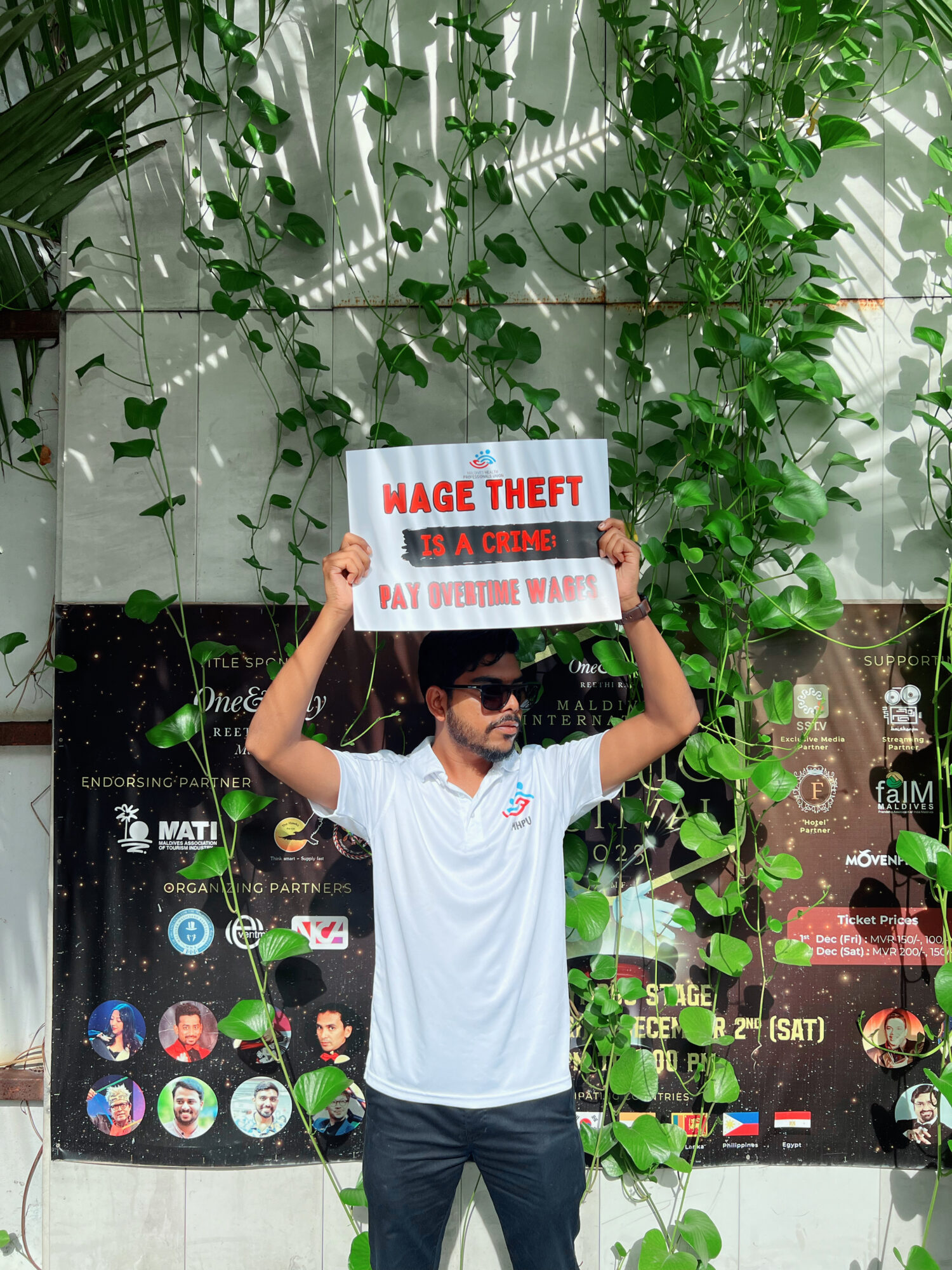
A health care worker holds a sign stating: “Wage theft is a crime–Pay overtime wages.” Credit: MHPU
The Solidarity Center collaborated with its partner, the Maldives Health Professionals Union (MHPU), on a robust campaign to advocate for legislative amendment, which was approved at the end of March and applies to all government healthcare workers.
In doing so, the Solidarity Center moved forward its core principle that when working people have the freedom and tools to organize, bargain and lead, they have the tools to build more just, inclusive and democratic societies. In facing the challenges confronting them, nurses in the Maldives could shape the policies and laws that truly make change for everyone by extending their voice and power through their union.
The Solidarity Center played a vital role in providing training and technical assistance to partner unions, including MHPU. The successful overtime campaign reflects the strategies the union gained, and its new focus facilitated workers in building grassroots, structured organizing efforts focused on strategies that educate and mobilize workers to build collective power.
“We want to ensure that all workers are safeguarded against unpaid forced labor, as it directly impacts both patient care and life beyond work of the individual,” says Fatimath Zimna, MHPU general secretary.
“The Solidarity Center was a huge partner in the campaign in passing two very crucial [pieces of] legislation,” Zimna says.
Achieving nurse overtime pay continued Solidarity Center efforts with the Maldives Trade Union Congress (MTUC) and MHPU to improve job safety and health and the legally guaranteed democratic worker rights, such as the freedom to form unions and take part in peaceful protests.
The Solidarity Center worked closely with the unions throughout much of the decade-long campaign for job safety and health, providing mobilizing and technical training and assisting in the drafting process. Its passage goes a long way toward protecting workers’ rights, says Zimna, and highlights the importance of workers joining together in unions to improve working conditions that also benefit the community.
“It is important for workers to organize into unions and raise their voices collectively to protect workers’ interests to fully entertain the rights given by the two acts.”
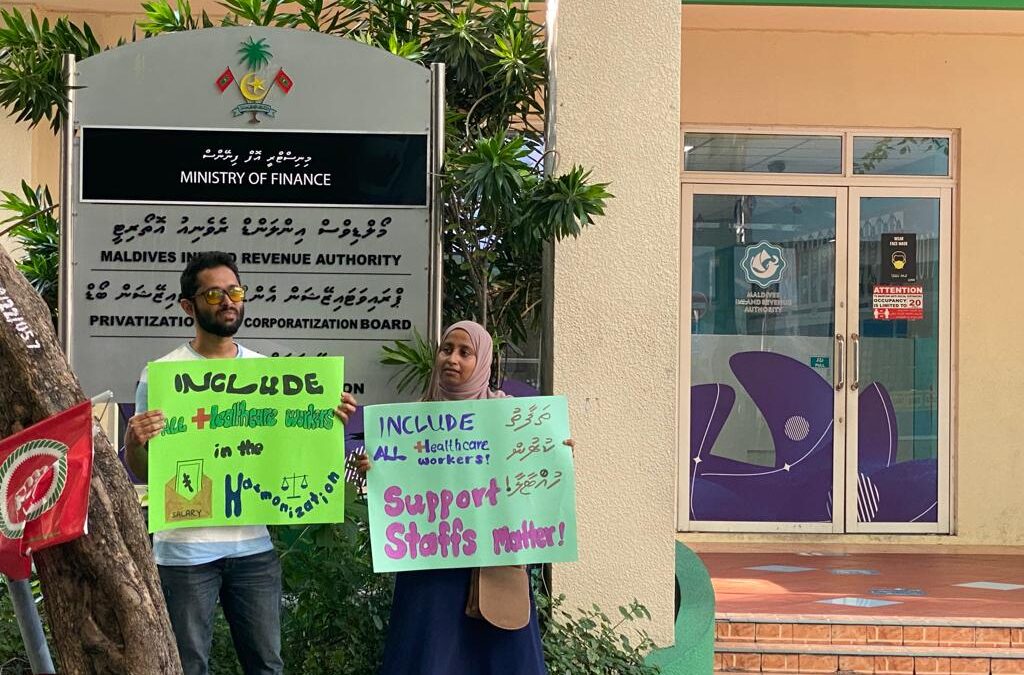
Apr 8, 2025
Health care workers working in the public sector throughout the Maldives will now receive overtime pay in full for all public holidays, resulting from a robust campaign spurred by the Maldives Health Professionals Union (MHPU).
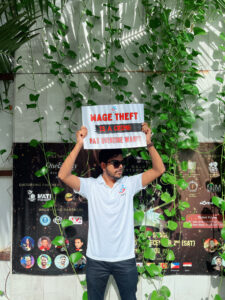
A health care worker holds a sign stating: “Wage theft is a crime–Pay overtime wages.” Credit: MHPU
The new amendment, approved at the end of March, covers all 9,000 government health care workers and removes a 10 percent cap on salary for public holidays. Paid overtime includes all public holidays, such as Fridays, which are part of the official weekend in the Maldives Solidarity Center, an MHPU partner, has provided advocacy and organizing support.
“This recent change, achieved through the relentless efforts of many dedicated individuals, marks a significant step toward ensuring health care workers receive the compensation they rightfully deserve for their tireless commitment,” says Ramsha, a public health program officer.
Staffing shortages have meant nurses and many health care employees regularly work between 40 and 60 hours of overtime each month—all with no pay. Under the new amendment, workers will be compensated if they are assigned extra hours of work during public holidays.
The health care workers often work extra hours beyond their regular schedule, sacrificing their personal and family life. The recent amendment protects wages—- especially during public holidays—and provides additional income protections in the struggling economy.
“They were compelled to work because of shortages,” says Fathimath Zamnia, MHPU general secretary. “Many are kept on call 24/7 and some work 12 hours, with no adequate rest between the next shift.” Hours standing to care for patients resulted in young workers using pain-relief patches, undergoing spinal surgeries and often suffering from chronic illness, adversely affecting families.
“Health care workers are highly service-oriented and often make significant sacrifices,” Zimna says.
Health care workers say that while the amendment does not address all issues related to overtime, “we want to ensure that all workers are safeguarded against unpaid forced labor, as it directly impacts both patient care and life beyond work of the individual.”
Solidarity Center Builds New Strategies
Solidarity Center has played a vital role in providing training and technical assistance to partner unions, including MHPU in the Maldives. The successful overtime campaign reflects the new strategies Zimna and the union gained in both the Solidarity Center’s Global Labor Leadership Institute and Global Organizing Institute. Their new focus facilitated unions to build a grassroots structured organizing campaigns focused on strategies that educate and mobilize workers to build collective power.

“We want to ensure that all workers are safeguarded against unpaid forced labor”–Fathimath Zimna. Credit: Solidarity Center / Mollie Relihan
The public campaign included media coverage in newspapers, involving agitating workers through social media to highlight their struggles. As more workers became involved on Facebook and X (Twitter), two common platforms, more workers reached out using the union hashtag, with their friends and relatives joining.
The healthcare workforce continues to face multiple issues in their working environments, “We are dedicated to strengthening workers’ collective power and continuously striving to achieve better working conditions and improved quality of care,” Zimna says.
Bolstering Worker Wins
Bolstering fundamental democratic principles such as decent wages and safe working conditions, the Maldives Trade Union Congress (MTUC) and MPHU began a years-long struggle for passage of the Industrial Relations Act in 2024, which, with its emphasis on the protection of worker rights, unions say paves the way for economic and social progress.
“The Solidarity Center was a huge partner in the campaign in passing two very crucial [pieces of] legislation,” says Zimna. “The legal proceedings of the campaign were handled by the Public Interest Law Centre, which also was supported by the Solidarity Center. By providing technical and strategic support, Solidarity Center also assisted in conducting training sessions and running educational programs for workers.”
As the union builds the campaign around critical issues facing workers, the Industrial Relations Act provides provisions that “create an enabling environment to form unions, organize workers and achieve collective agreements across all sectors in the Maldives,” Zimna says. In addition, unions succeeded in passage of a Occupational Safety and Health bill that underscores stringent obligations for employers, emphasizing workplace safety standards, compensation frameworks and penalties for non-compliance.
“I feel this is a great win for the union workers. Our rights have been neglected for so long, but we have come so far through our work within the union,” says Shifana Ali, a medical laboratory assistant and active participant in the campaign.
Over the past five years, MHPU, a Solidarity Center partner, has received essential support in advocacy and organizing efforts.
“Workers in the Maldives often are challenged with low wages and poor working conditions,” Zimna says. “A majority of workers in Maldives are migrants, and the growing workforce often is exploited and exposed to unsafe conditions.
“The experiences that we share are similar—as with many workers around the world, the solution lies in organizing workers and building our collective power to resist, fight and win for the workers. We are strongly committed to organizing workers in the Maldives.”
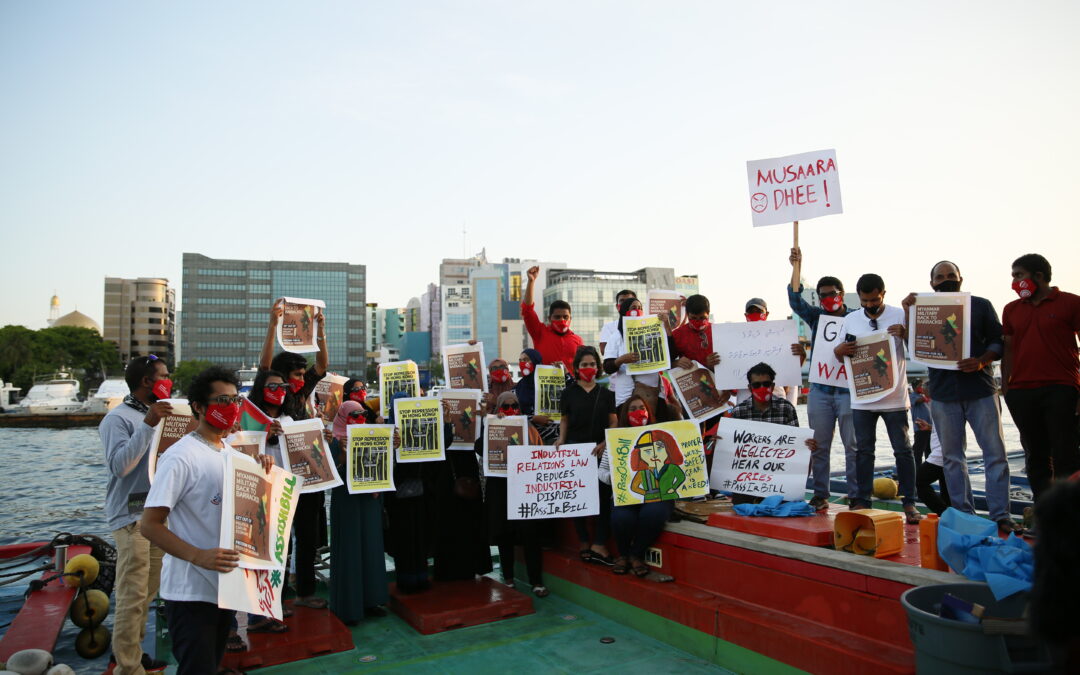
Jan 5, 2024
After a decade of relentless advocacy by the trade unions in the Maldives, President Mohamed Muizzu ratified on January 2 the Industrial Relations and Occupational Safety and Health bills passed by parliament with a super majority in mid December. Enactment of the law marks a monumental stride toward safeguarding worker rights and fostering industrial harmony in the Asian archipelago.
The Industrial Relations Act solidifies a structured framework for consultation and social dialogue among government entities, workers and employers. This framework stands as a beacon for the protection of worker rights, paving the way for economic and social progress, unions say. At its core lies the establishment of the National Tripartite Labor Advisory Council, ensuring the protection of collective bargaining rights and robust mechanisms for resolving industrial disputes through mediation. The Act institutionalizes key worker rights, like the rights to freedom of association and assembly, and empowers both local and migrant workers to collectively negotiate for their interests and welfare.
Simultaneously, the Occupational Safety and Health bill underscores stringent obligations for employers, emphasizing workplace safety standards, compensation frameworks and penalties for non-compliance. This legislation reflects a firm commitment to international standards and fundamental human rights, ensuring a safer and healthier work environment for all.
Congratulating the trade union movement of the Maldives on this crucial victory, Mauroof Zakir, president of Maldives Trade Union Congress (MTUC), said the passage of both bills “represents a historic victory for the working class in the Maldives. It is indeed a great achievement to empower workers and contribute to strengthening the democratic principles of the nation.”
On a similar note, Fathimath Zimna, MTUC general secretary, said, “Enactment of Industrial Relations Act and Occupational Safety and Health Act marks a significant milestone and victory that was achieved through a relentless campaign by Maldives unions. It is an important stride forward in achieving the decent work agenda in the Maldives. The journey of unions and workers will stand as a symbol of resilience and strength to working people of the world. It resembles what working people can achieve through collective voice. It is important for workers to organize into unions and raise their voices collectively to protect workers’ interests to fully entertain the rights given by the two acts.” She added that, “It is just the beginning for many more victories for the working people and their families. We would like to extend our appreciation and gratitude to all our partner organizations, including Solidarity Center and the global union federations for their support and solidarity.”












